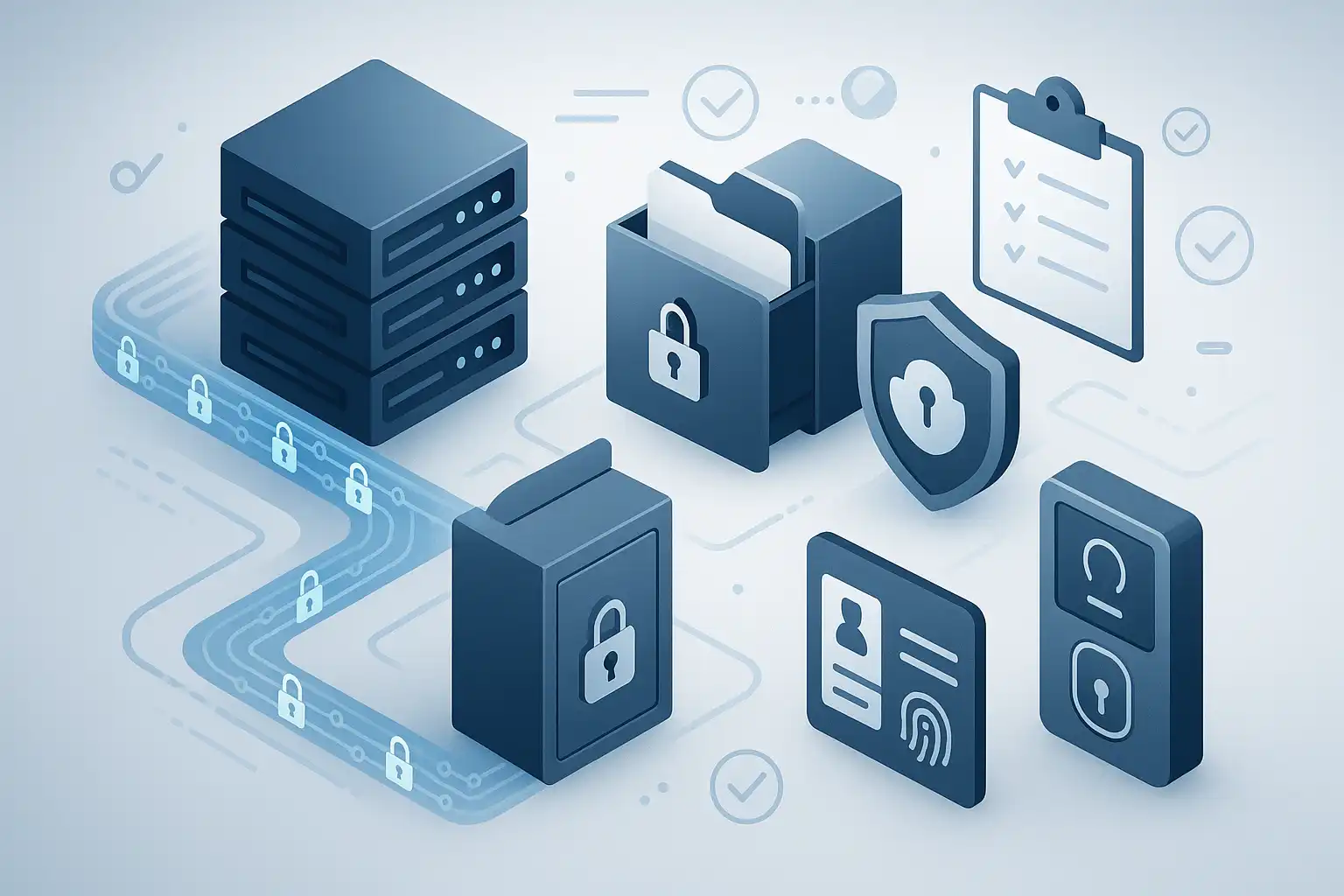
In today’s digital world, data compliance and security services are essential for keeping your business safe. These services combine advanced security measures and regulatory practices to protect sensitive information from threats and ensure your company stays compliant with laws like GDPR, HIPAA, and PDPA. Whether you’re operating locally or on a global scale, working with the right solutions helps prevent data leaks, avoid fines, and build trust with your customers.
Securing business data isn’t only about technology. It’s about following rules, maintaining accurate records, and respecting your customers’ privacy. Let’s walk through what makes effective data compliance and security services and how they safeguard your business every step of the way.
What Are Data Compliance and Security Services?
Data compliance and security services are solutions designed to protect digital information, support secure handling, and help organizations meet legal requirements. These services often include a mix of software tools, policies, and expert advice to minimize risks related to data breaches, improper handling, or unauthorized access.
For example, a comprehensive approach might include:
- Data encryption to keep information private
- Multi-factor authentication (MFA) for access control
- Automated audits to monitor compliance
- Employee training for cyber awareness
- Secure data disposal practices for outdated files
- Vulnerability assessments to detect system weaknesses
By using these services, businesses strengthen their defenses and reduce the chance of cyber incidents or costly fines.
Why Is Data Compliance Important for Businesses?
Compliance is not just about following the letter of the law. It’s about supporting ethical business practices and showing your customers that you value their privacy. In industries like finance, healthcare, or retail, failing to comply with data privacy regulations can lead to large fines, legal troubles, and loss of reputation.
If you’re trying to optimize your organization’s data governance strategy, it’s crucial to remember that compliance isn’t a one-time event. It requires ongoing attention, with regular reviews and updates whenever regulations change or new technologies are introduced.
For businesses operating across borders, understanding various compliance standards, such as the European Union’s GDPR or Singapore’s PDPA, is a must. Data compliance and security services help you navigate these rules with confidence, creating clear procedures so everyone in your company knows what’s expected.

How Do Data Compliance and Security Services Protect Your Business?
The core goal of these services is to guard your organization’s sensitive information at every stage of its life—from collection and storage to sharing and eventual removal. Let’s look at some of the protective features:
- Data Integrity Measures: Services offer encryption and checksums, ensuring that data remains accurate and unaltered during transit or storage.
- Access Controls: Multi-factor authentication, role-based permissions, and regular audits help stop unauthorized access before it happens.
- Incident Response: In the event of an attack or breach, these solutions provide clear plans and rapid communication protocols to contain issues quickly.
- Legal Compliance Tools: Built-in features help businesses keep up with privacy laws, automatically flagging non-compliant actions and recommending fixes.
- Secure Data Disposal: Removing old or redundant information in a secure way lowers the risk of accidental exposure.
- Continuous Training: Regular staff education raises awareness about current threats and safe handling of data.
Suppose your company is considering outsourcing data management cost quality to a third party. In that case, robust compliance and security services become even more important. They help ensure external partners follow the same strict standards as your internal teams.
What Features Should You Look for in Data Compliance and Security Services?
Not all solutions are created equal. Here are the top features to consider when evaluating which service fits your needs:
- Comprehensive Coverage: Look for services that address all types of data—financial records, customer information, employee files, and more.
- Regulatory Support: Choose tools that are updated regularly to reflect changing legal requirements in your region.
- Customizable Controls: The ability to set access rights and permissions according to job roles strengthens overall security.
- Automated Monitoring: Real-time alerts about unusual activity allow quick response to potential threats.
- Employee Training Modules: Built-in educational resources help staff stay current on best practices.
- Easy Integration: Services should work well with existing business systems, such as cloud storage, CRM platforms, or communication tools.
- Scalable Solutions: As your business grows, your compliance tools should adapt—supporting everything from startups to large enterprises.
Working with data migration consulting experts during upgrades or digital transformation projects ensures your compliance and security solutions remain effective throughout change.
How Can You Integrate Data Compliance and Security Services Into Your Business?
Getting started with these services does not have to be overwhelming. Follow a step-by-step approach to ensure a smooth transition:
- Assess Your Risks: Map out where sensitive data is stored, who can access it, and which regulations apply to your industry.
- Set Clear Policies: Write straightforward guidelines for collecting, using, and sharing information throughout your business.
- Implement Strong Controls: Use technologies like encryption, MFA, and secure backups to reduce risk.
- Train Your Team: Regular workshops and cyber awareness sessions keep your staff informed and alert.
- Schedule Regular Reviews: Conduct audits and vulnerability checks, making adjustments as needed.
- Plan for the Unexpected: Create incident response plans so your team knows exactly what to do if a problem arises.
- Safely Dispose of Data: When information is no longer needed, use secure methods to delete or destroy it.
During major transitions, such as when using data conversion clean and migrate services, align your strategy with best practices to avoid exposing sensitive information or violating compliance rules.
What Are the Benefits of Using Data Compliance and Security Services?
Adopting a proactive approach to data compliance and security brings several advantages:
- Risk Reduction: Fewer breaches and a lower chance of legal trouble
- Peace of Mind: Employees and customers know their information is safe
- Improved Reputation: Trust grows with proof of secure, ethical operations
- Operational Efficiency: Automated tools and clear processes save time and money
- Competitive Edge: Compliance can be a selling point, especially when winning new clients or contracts
Real-World Example
Consider a healthcare provider required to protect patient files under HIPAA. By using robust compliance and security services, they can encrypt records, control staff access, and create a clear audit trail. This not only avoids penalties but also reassures patients their medical history is in safe hands.

Frequently Asked Questions (FAQ)
What key features should I look for in data compliance and security services?
Focus on comprehensive protection—data encryption, regulatory support, strong access controls (like MFA), secure disposal, employee training, and automated monitoring. These features help cover all aspects of security and compliance, keeping your information accurate and protected at each stage.
How do data compliance and security services help avoid regulatory penalties?
These services ensure your business follows laws such as GDPR, HIPAA, and PDPA by guiding data handling, tracking activity, and automating compliance checks. You can avoid fines, lawsuits, and reputation loss by meeting these standards consistently.
What are best practices for integrating these services?
Begin with a thorough risk assessment, use data discovery and classification tools, implement multi-factor authentication and encryption, and schedule regular staff training. Continuous audits, secure data disposal, and working with experienced consultants all improve your compliance journey.
Are these services necessary for small businesses?
Yes. Small businesses are also targets for cyber threats and must follow the same regulations as larger organizations. Scalable solutions can fit budgets and are vital for protecting sensitive customer or financial data from the beginning.
